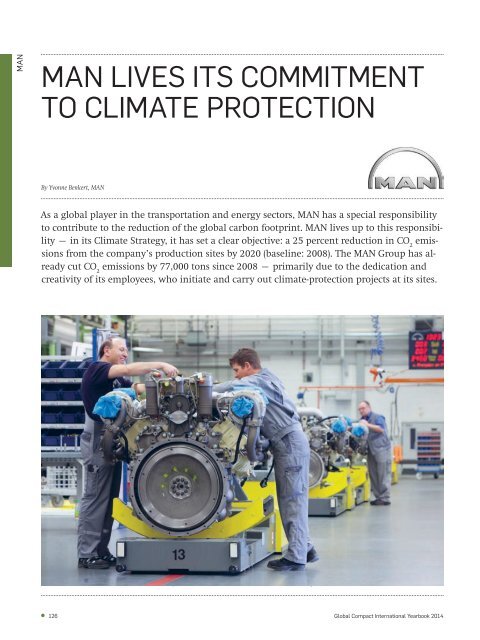Global Compact International Yearbook 2014
Fighting poverty and global warming are key challenges for mankind. „This year we are laying the groundwork for success in 2015 on three fronts: achieving the Millennium Development Goals, adopting a meaningful new climate agreement, and establishing a new vision for a sustainable future“, UN Secretary-General Ban Ki-moon says in the 2014 edition of the Global Compact International Yearbook. Edited by macondo publishing the new yearbook offers insights to political as well as sustainability issues. This years´ focus lies on the Post-2015 Agenda. We discuss the transition from Millennium Development Goals to Sustainable Development Goals. Question are among others: Are the concepts compatible? How does the architecture of a sustainable future look like? And above all: What role does corporate responsibility play in this context? The second key aspect in our Post-2105 discussion is about measuring the SDGs. In the past indicators have been developed and used in reporting progress toward the MDGs, and now the approach to upcoming SDGs must be systematically developed. This section also includes lessons from innovation management and "big data". Climate change is another focus of teh yearbook. It counts on very prominent authors like Christiana Figueres, Executive Secretary of the UN Framework Convention on Climate Change (UNFCCC), and Sigmar Gabriel, Vice-Chancellor of the German government and Federal Minister for Economic Affairs and Energy. Other issues are : Traceability: How certification brings positive impacts and better traceability to business. Elaborated NGO inputs by Karin Kreider, the Executive Director of the ISEAL Alliance and one of the world’s leading experts on credible certification and eco-labeling, as well as Markus Arbenz, Executive Director of the International Federation of Organic Agriculture Movements (IFOAM) and Caroline Hickson, Director of Brand, Communications and Strategic Partnerships at Fairtrade International. Mandatory CSR: When CSR discussions started in the late 1960s, early 1970s ethical and moral arguments were the drivers. Since then CSR activities have become more holistic and professional. This becomes a principle-based approach in which business seeks to identify smarter business models, products, and services. Elmer Lenzen illuminates the boder zone between voluntary and mandatory CSR.
Fighting poverty and global warming are key challenges for mankind. „This year we are laying the groundwork for success in 2015 on three fronts: achieving the Millennium Development Goals, adopting a meaningful new climate agreement, and establishing a new vision for a sustainable future“, UN Secretary-General Ban Ki-moon says in the 2014 edition of the Global Compact International Yearbook. Edited by macondo publishing the new yearbook offers insights to political as well as sustainability issues.
This years´ focus lies on the Post-2015 Agenda. We discuss the transition from Millennium Development Goals to Sustainable Development Goals. Question are among others: Are the concepts compatible? How does the architecture of a sustainable future look like? And above all: What role does corporate responsibility play in this context?
The second key aspect in our Post-2105 discussion is about measuring the SDGs. In the past indicators have been developed and used in reporting progress toward the MDGs, and now the approach to upcoming SDGs must be systematically developed. This section also includes lessons from innovation management and "big data".
Climate change is another focus of teh yearbook. It counts on very prominent authors like Christiana Figueres, Executive Secretary of the UN Framework Convention on Climate Change (UNFCCC), and Sigmar Gabriel, Vice-Chancellor of the German government and Federal Minister for Economic Affairs and Energy.
Other issues are :
Traceability: How certification brings positive impacts and better traceability to business. Elaborated NGO inputs by Karin Kreider, the Executive Director of the ISEAL Alliance and one of the world’s leading experts on credible certification and eco-labeling, as well as Markus Arbenz, Executive Director of the International Federation of Organic Agriculture Movements (IFOAM) and Caroline Hickson, Director of Brand, Communications and Strategic Partnerships at Fairtrade International.
Mandatory CSR: When CSR discussions started in the late 1960s, early 1970s ethical and moral arguments were the drivers. Since then CSR activities have become more holistic and professional. This becomes a principle-based approach in which business seeks to identify smarter business models, products, and services. Elmer Lenzen illuminates the boder zone between voluntary and mandatory CSR.
You also want an ePaper? Increase the reach of your titles
YUMPU automatically turns print PDFs into web optimized ePapers that Google loves.
man<br />
man LIveS ItS COmmItment<br />
tO CLImate PrOteCtIOn<br />
By Yvonne Benkert, MAN<br />
As a global player in the transportation and energy sectors, MAN has a special responsibility<br />
to contribute to the reduction of the global carbon footprint. MAN lives up to this responsibility<br />
– in its Climate Strategy, it has set a clear objective: a 25 percent reduction in CO 2<br />
emissions<br />
from the company’s production sites by 2020 (baseline: 2008). The MAN Group has already<br />
cut CO 2<br />
emissions by 77,000 tons since 2008 – primarily due to the dedication and<br />
creativity of its employees, who initiate and carry out climate-protection projects at its sites.<br />
126 <strong>Global</strong> <strong>Compact</strong> <strong>International</strong> <strong>Yearbook</strong> <strong>2014</strong>

















